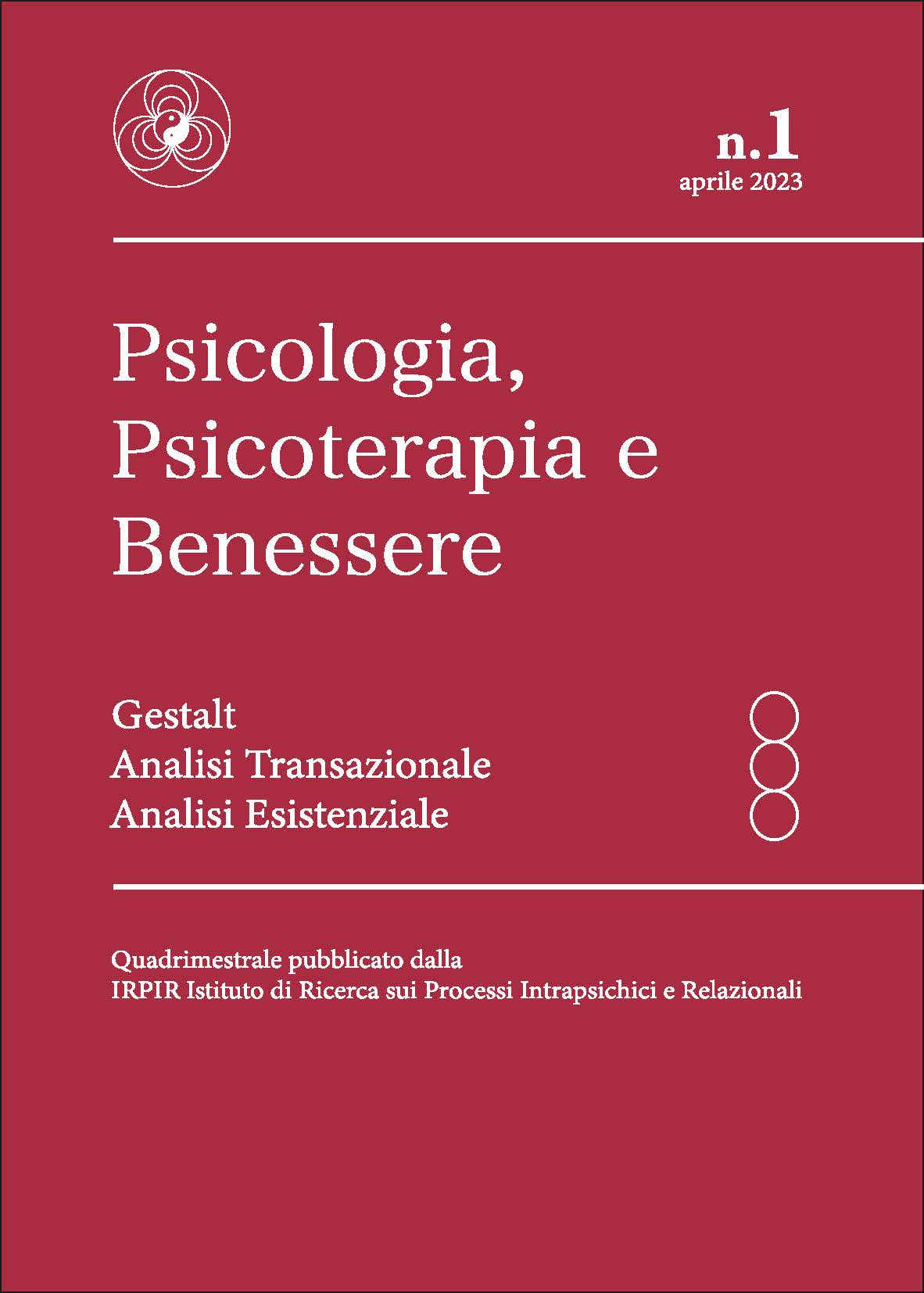Prevenzione e gestione delle ricadute in ottica analitico-transazionale: un esempio clinico
Keywords:
Substance Use Disorder, addiction, relapse, relapse prevention and management, relapse risk indicators, Transactional Analysis, stages of recoveryAbstract
The article aims to deepen the concept of relapse in substance use disorder and addiction disorders, by reviewing the various relapse risk indicators and analyzing the relationship between recovery phases and work on relapse.
Then, it focuses on the contribution of Transactional Analysis to the work of relapse prevention and management, articulating it into three points: a) a summary of White's conceptualization (2013) on the relapse process; b) the proposal of some guidelines for relapse prevention and management; c) the presentation of a clinical case in order to illustrate these guidelines.
References
Alcolisti Anonimi (1999). Alcolisti Anonimi. III ed. italiana. Servizi Generali A.A.
American Psychiatric Association (2014). Manuale diagnostico e statistico dei disturbi mentali. Quinta edizione. DSM-5. Raffaello Cortina Editore.
Barrett, K. & Marlatt, G.A. (2001). Prevenzione delle ricadute e riduzione del danno nel trattamento della dipendenza da sostanze concomitanti a problemi di salute mentale. In Dowd E.T. & Rugle L. (Eds.), La tossicodipendenza. Trattamenti a confronto (pp. 199-216). MacGraw-Hill.
Berne, E. (1969). Guida per il profano alla psichiatria e alla psicoanalisi. Casa Editrice Astrolabio.
Berne, E. (1998). A che gioco giochiamo. XII edizione. Bompiani.
Brown, S. (1997). Alcolismo. Terapia multidimensionale e recupero. Erickson.
Brown, R.I.F. (1993). Some contributions of the study of gambling to the study of other addictions. In W.R. Eadington & J. Cornelius (Eds.), Gambling Behavior and Problem Gambling (pp. 341-372). University of Nevada Press, Reno.
Caselli, G. (2012). Psicoterapia cognitiva: le dipendenze patologiche e il lato oscuro del desiderio. In: https://www.stateofmind.it/2012/03/psicoterapia-cognitiva-lato-oscuro-del-desiderio/ (consultato il 16/04/2023).
Connors, G.J., DiClemente, C.C., Velasquez, M.M. & Donovan, D.M. (2013). Substance abuse treatment and the stages of change. Guilford Press.
Daley, D.C. (1989). Relapse: a guide to successfull recovery. Bradenton, FL: Human Services Institute.
Daley, D.C. & Marlatt, G.A. (1992). Relapse prevention: cognitive and behavioural interventions. In Lowenson, J.H., Ruiz, P., Millman, R.B. & Langrod, J.C. (Eds.), Substance abuse: a comprehensive textbook (pp. 633-645). Williams and Wilkins.
DiClemente, C.C. & Velasquez, M.M. (2007). Il colloquio motivazionale e gli stadi del cambiamento. In Miller, W.R. & Rollnick, S. (Eds.). Il colloquio motivazionale. Seconda edizione. Preparare la persona al cambiamento (pp. 239-257). Erickson.
Fairbairn, C.E., Briley, D.A., Kang, D., Fraley, R.C., Hankin, B.L. & Ariss, T. (2018). A Meta-Analysis of Longitudinal Associations Between Substance Use and Interpersonal Attachment Security. American Psychological Association.
Gorski, T.T. (1990). The Cenaps model for relapse prevention: basic principles and procedures. Journal of Psychoactive Drugs, 22(2), 125-133.
Gorski, T.T. & Grinstead, S.F. (2010). Relapse prevention therapy workbook. Independence: Herald Publishing House/Independence Press.
Griffiths, M. (1996). Behavioural addiction: an issue for everybody? The Journal of Workplace Learning, 8(3), 19-25.
Griffiths, M. (2005). A ‘components’ model of addiction within a biopsychosocial framework. Journal of Substance Use, 10(4), 191-197.
Karpman, S.B. (1968). Fairy tales and script drama analysis. Transactional Analysis Bulletin, 7(26), 39-43.
Kats, R.S. & Ney, N.H. (1997). La prevenzione delle ricadute. In Brown, S. (Ed.) Alcolismo. Terapia multidimensionale e recupero (pp. 227-268). Erickson.
Krystal, H. (1978). Self-representation and the capacity for self-care. Annual of Psychoanalysis, 6, 209-247.
Linehan, M.M. (2001). Trattamento cognitivo-comportamentale del disturbo borderline. Raffaello Cortina Editore.
Mansueto, G., Martino, F., Palmieri, Scainid, S.S., Ruggiero, G.M., Sassaroli, S. & Caselli, G. (2019). Desire Thinking across addictive behaviours: A systematic review and metaanalysis. Addictive Behaviors, 98, 1-11.
Marlatt, G.A. & Donovan, D.M. (2008). Relapse prevention. Maintenance strategies in the treatment of addictive behaviors. Guilford Press.
Marlatt, G.A. & Gordon, J. (1985). Relapse prevention: a self-control strategy for the maintenance of behaviour change. Guilford Press.
Matthews, G. & Wells, A. (2004). Rumination, depression and metacognition: the S-REF model. In C. Papageorgiou & A. Wells (Eds.). Depressive Rumination: Nature, Theory and Treatment. John Wiley & Sons Ltd.
Morgan, O.J. (2021). Dipendenza, attaccamento, trauma e recovery. Giovanni Fioriti Editore.
Parnell, L. (2020). Il trattamento basato sull’EMDR per le dipendenze. Raffaello Cortina Editore.
Pelli, S. (2007). La prevenzione delle ricadute nel trattamento semi-residenziale: un modello di analisi dei processi psicologici. In Casciani, O. & Masci, G. (Eds.). Non solo doppia diagnosi. Clinica delle dipendenze e dei comportamenti di abuso/Quaderni (pp. 146-150). Franco Angeli.
Schenker, M.D. (2009). A clinician’s guide to 12-step recovery. W.W. Norton and Co.
Schiff, J.L. (1980). Analisi transazionale e cura delle psicosi. Casa Editrice Astrolabio.
Scilligo, P. (2009). Analisi transazionale socio-cognitiva. LAS.
Spada, M.M. & Wells A. (2009). A Metacognitive Model of Problem Drinking. Clinical Psychology and Psychotherapy, 16, 383-393.
Steiner, C.M. (1974). Games alcoholics play. Ballantine Books.
Steiner, C.M. (1981). Healing alcoholism. Grove Press.
Steiner, C.M. (2011). Copioni di vita, IV ed. La Vita Felice.
Teesson, M., Dagenhardt, L. & Hall, W. (2006). Le tossicodipendenze. Il Mulino.
Vasale, M. & Tonioni, F. (2010). La ricaduta e le strategie di prevenzione e gestione della ricaduta. In Fanella (Ed.). Il trattamento terapeutico-riabilitativo della dipendenza patologica (pp. 107-120). Alpes.
Vasale, M. (2010). Il concetto di recupero: gli stadi del recupero e le fasi generali del trattamento. In Fanella, (a cura di). Il trattamento terapeutico-riabilitativo della dipendenza patologica (pp. 91-105). Alpes.
White, T. (2013). Working with drug and alcohol users. A guide to providing understanding, assessment and support. Jessica Kingsley Publishers.
Downloads
Published
How to Cite
Issue
Section
License
Copyright (c) 2023 PSICOLOGIA, PSICOTERAPIA E BENESSERE

This work is licensed under a Creative Commons Attribution-NonCommercial 4.0 International License.






